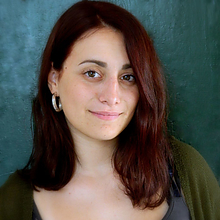UMD Alumna Wins Best Thesis Award for Machine Translation Research

A University of Maryland alumna has received a prestigious thesis award for her groundbreaking work in machine translation, where she developed algorithms to identify subtle shifts in meaning, enhancing translation accuracy for critical legal, medical and technical documents.
Eleftheria Briakou, who earned her Ph.D. in computer science in 2023, recently won the Best Thesis Award from the Association for Machine Translation in the Americas (AMTA) for her dissertation, "Detecting Fine-Grained Semantic Divergences to Improve Translation Understanding Across Languages,” which was praised for its innovative approach and significant contributions to the field.
Representing North America, the AMTA collaborates with its sister Asian-Pacific and European associations to promote cooperation among researchers and practitioners, providing a global platform for sharing advancements in translation technology.
Briakou’s research at UMD focused on detecting subtle meaning differences in translated texts. These fine-grained divergences present challenges for both human and machine translators. Her work aimed to improve translation accuracy by identifying these differences, especially in complex documents.
“As translation systems’ quality continues to improve, detecting fine-grained meaning differences becomes increasingly critical,” Briakou says.
She adds that the rise of large language models (LLMs) further underscores this need, as their impressive fluency can lead to over-reliance. While these models excel in translating longer texts, there is a pressing demand for tools that help users identify subtle meaning differences that may be overlooked due to the fluency of outputs or the sheer volume of information.
Marine Carpuat, an associate professor of computer science and Briakou’s adviser, conveyed her delight over Briakou’s recognition, noting that this type of research is crucial for advancing the field of machine translation.
“This was a niche area when Eleftheria started her Ph.D., but it has become increasingly important as multilingual large language models can easily generate text in many languages,” says Carpuat, who also holds an appointment in the University of Maryland Institute for Advanced Computer Studies. “Eleftheria’s dissertation lays the groundwork for developing more trustworthy AI tools for cross-language communication. I’m excited to see what she will accomplish next.”
Reflecting on her recognition, Briakou expressed gratitude to Carpuat and the Computational Linguistics and Information Processing (CLIP) Laboratory for their invaluable guidance.
“Receiving this award is a true honor, and it wouldn’t have been possible without the incredible support I’ve received throughout my Ph.D. journey," she says. “I am deeply grateful to all the wonderful mentors and collaborators who have contributed to my growth.”
Briakou will present her dissertation on October 1 at the AMTA 2024 conference in Chicago.
Now a research scientist at Google Translate, Briakou is building on her dissertation research by applying LLMs to translation tasks. She focuses on reimagining machine translation by modeling the intermediate reasoning steps that clarify translation decisions.
—This story was adapted from an article by CS communications
